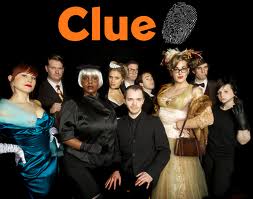 A genre of theatre that seems to be very popular in the Bay Area is plays that are based on movies. From Hush Up Sweet Charlotte (a drag take starring Varla Jean Merman on the 1960s Bette Davis thriller Hush…Hush, Sweet Charlotte) to Point Break Live! (a show relying on heavy audience participation based on the 1991 Keanu Reeves surf action movie), local audiences have relished the fun of seeing their favorite cult screen kitsch transformed into stage madness.
A genre of theatre that seems to be very popular in the Bay Area is plays that are based on movies. From Hush Up Sweet Charlotte (a drag take starring Varla Jean Merman on the 1960s Bette Davis thriller Hush…Hush, Sweet Charlotte) to Point Break Live! (a show relying on heavy audience participation based on the 1991 Keanu Reeves surf action movie), local audiences have relished the fun of seeing their favorite cult screen kitsch transformed into stage madness.
The recipe is a relatively fool-proof one: Take over-the-top film with mass-market appeal that reminds hipsters of their childhood days, mix in the immediacy of live theatre, throw in a crowd-pleasing gimmick or two, and Hey Presto, you have a certifiable hit on your hands.
Boxcar Theatre has picked up on this trend with its new production of Clue, a play based on a 1985 black comedy which in turn was inspired by the Clue murder-mystery board game (or Cluedo to people who grew up outside of the US.)
Boxcar’s production has a lot of heart in it and it makes for an entertaining way to spend a couple of hours. What I love best about the production is the use of the space. The company has turned their small black box in a particularly grubby bit of SOMA into a visually-arresting three-dimensional boardgame. The audience looks down on the stage from a four-sided specially-constructed gallery like players looking at a Clue board from above. The space below is divided into small squares representing the different rooms in the Clue game and a rabbit warren of concealed tunnels runs between various doors and secret entrances. Watching the actors pop in and out of fireplaces and refrigerators is tantalizing. The cast does a great job of playing up the silliness of the source material. It’s a colorful production which will doubtless draw in the crowds throughout the already-extended run.
But beyond being a bit of a hoot and visually bombastic, the director/playwrights (and Boxcar co-artistic directors) Peter Matthews and Nick Olivero miss out on an opportunity to explore the more intriguing metaphors that the multi-layered play-film-boardgame concept could potentially bring to the stage. What’s the difference between murder as it’s played out on stage versus a movie versus a board game? And what’s the audience’s relationship to the action?
